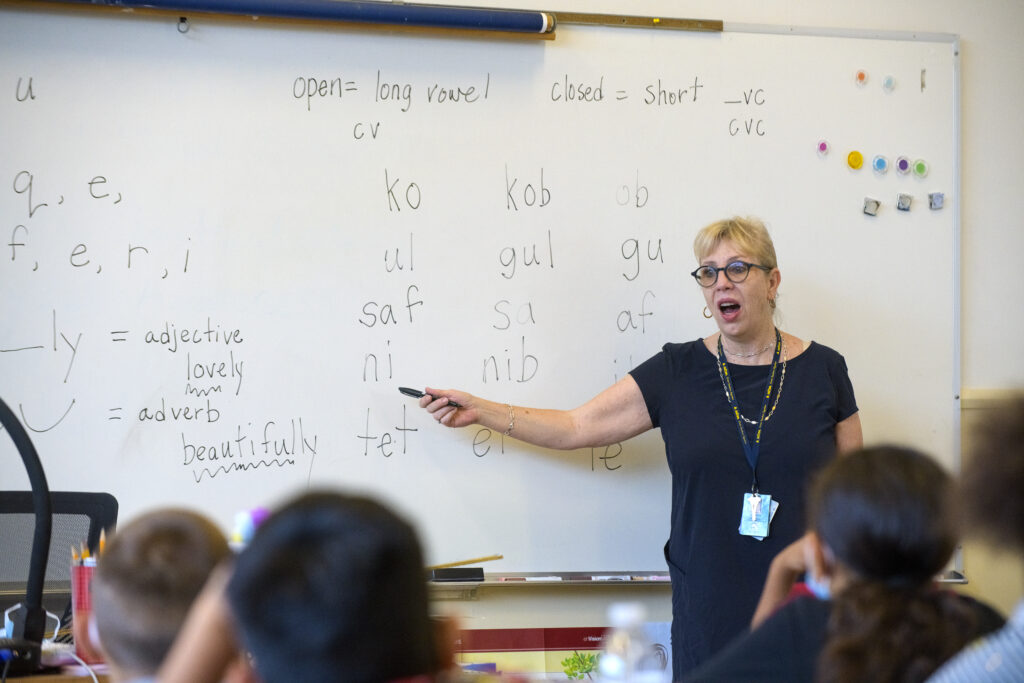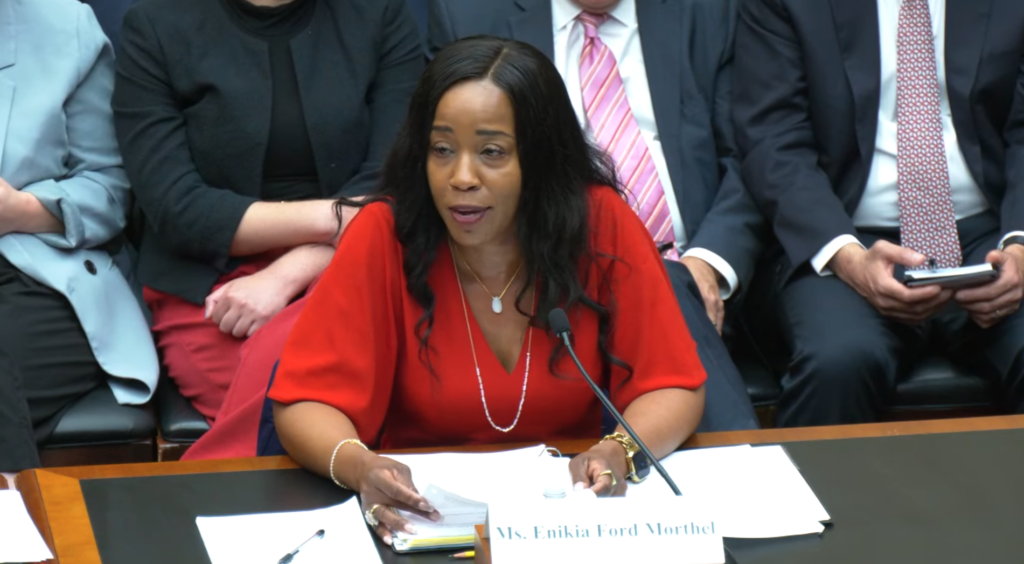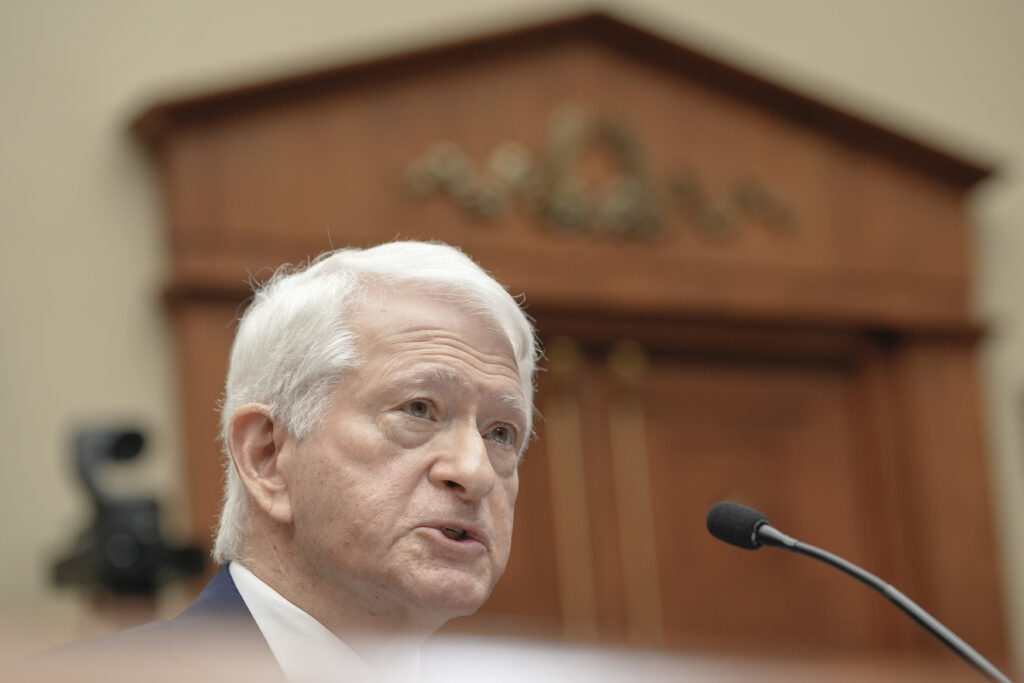
Credit: Allison Shelley / EDUimages
After a contentious road to approve a new set of statewide guidelines on teaching students math, California officials must still figure out how to support school districts with implementation.
The 2023 Math Framework, which the State Board of Education passed in July, is a 1,000-page document that details what many state and education officials accept as the best practices to teach mathematics. Although not everyone agreed and controversies arose during the four years of work it took to reach approval, math experts and organizations across the state are beginning to have conversations about what a statewide rollout could look like.
The state hasn’t provided funding for implementation, which is typical, said Mike Torres, director of curriculum frameworks and instructional resources for the Department of Education. Historically, any framework rollout isn’t funded and is implemented with outside collaborators who are experts in the topic. For the most part, district officials must find ways to fund professional development on their own.
“This situation with the mathematics framework is not different,” Torres said. “There isn’t any specific funding where we can pay experts to help us participate in webinars … or put on events.”
It’s unclear why California historically hasn’t set aside money to help districts with implementation once new guidelines are passed. But that could change.
During a press conference last month, State Superintendent Tony Thurmond said he intends to introduce legislation for funding for professional development for those teaching math and reading. The funds could be up to $500 million, he said.
Torres said the California Department of Education would need to find other ways to offset costs if events will be held. It’s too early to know what kind of rollout could or will happen. Torres and his team have had three meetings with groups they work with to talk about a framework rollout, he said.
There are many organizations collaborating with the California Department of Education on implementing the math framework, including the California Mathematics Project, California County Superintendents Curricular and Improvement Support Community (CISC), California Math Council, California Teachers Association, and County Offices of Education.
During other framework rollouts, districts have sent teams of teachers and administrators to training and then had them relay information to the rest of the staff, said Kyndall Brown, one of the framework authors and executive director of the California Mathematics Project – one of the state’s partners. It’s something that could be replicated during a math framework rollout.
Even if there are conferences teachers can attend, one professor says she isn’t a huge fan.
“One day of hearing these ideas doesn’t necessarily translate into having a balanced curriculum – at all,” said Karajean Hyde, co-director of the UC Irvine Math Project. “It doesn’t necessarily create change in the classroom.”
To create changes that will increase students’ proficiency in math, teachers need trainers who will work with them in and outside of classrooms on a consistent basis, Hyde said, which is work she does with her colleguues.
School districts do have pots of funding that could be used toward professional development, Brown said, such as special education funds or funds from the Local Control Funding Formula.
However, a $50 million math, science, and computer science professional learning grant the governor allocated in the 2022 budget could help to fund professional development. Some allocations have been given to the County Offices of Education, Torres said, and the offices handle how the money is used.
The timing of the grant worked out perfectly with the beginning of a math framework rollout, said Ellen Barger, an associate superintendent of curriculum and instruction at the Santa Barbara County Office of Education. Other grant funds are being used to support rural school districts in particular and the most recent grant will help to continue building coherence across all counties and to fill gaps.
“The framework is one of the tools that’s helping us achieve a vision of high-quality
mathematics for every California student, and we are building structures to bring people together to build knowledge and skills to operationalize that vision in every county, district, and community,” Barger said.
Equity in implementation
As of this school year, there will be 939 school districts in the state that will have to find resources to support educators in teaching under the new guidelines, which align with the California Common Core State Standards for Mathematics that were passed a decade ago.
How to make that equitable will be a difficult task.
Each school district has different needs, unique populations, and different levels of resources. For example, a district with more than 50,000 students will typically have more resources and staff to support professional development. A district with less than 50 kids might just have one staffer who is taking on multiple roles.
There are some school districts that haven’t yet finished implementing the common core standards, Brown said. The common core standards detail what students in each grade level need to master.
“There was no rollout of the 2013 framework (common core standards),” Brown said. “You had county offices and math project sites doing what we could, but we’re running into teachers who still don’t know about the elements of the common core standards.”
There are also always new teachers coming into schools who will need to be trained, Brown said. “We have years and years worth of content.”
But at least some colleges of education at California universities have had many aspects of the math framework already embedded in their curricula for the last decade. Professors at UC Davis, UC Irvine, and UC Riverside all spoke about how ideas in the framework have been used in their classrooms and the long history of controversy over how to teach math.
Karajean Hyde, co-director of the UC Irvine Math Project, works with districts to train teachers on how to teach math and students in the credential program. For years, she said, the focus has been on student engagement, understanding motivation, including student identities in lessons, and building healthy classrooms – all included in the math framework.
Most teachers teach the way they were taught, Hyde said, and learned shortcuts to solving math problems. It results in current and future teachers not understanding the mathematics behind what they’re teaching.
During professional development training, Hyde and other Irvine professors make sure educators begin to understand the concepts behind what they are teaching, she said. They spend time co-planning lessons, observing lessons being taught, and relating what they are teaching back to the common core standards.
“We need to make sure teachers understand the math and how to teach the math first and then it’s easier to help them consider – ‘How do I make this more engaging? How do I connect this back to the kid’s prior experience?’” Hyde said.
If teachers don’t understand the content “I fear they will just have a series of super fun, engaging lessons that kids feel super good about but they’re not actually mastering mathematics,” Hyde said. “I feel in turn is going to really increase the achievement gaps that we already have that are horrible in California.”
The professional development work UC Irvine is doing has helped the two dozen districts they work with, but there are still many districts that don’t have this kind of support in place.
It will take years until every student in California is exposed to a way of learning math that follows the guidelines in the framework and Brown says, “Something needs to change.”
Only about 35% of California students met or exceeded math standards this year, only about 1% higher than the previous year. Smarter Balanced Assessment results were lower for Black and brown students.
About 17% of African-American students and nearly 23% of Hispanic students in the state
met or exceeded math standards in 2023, which was only about a 1% increase from the prior year. Brown called the results “horrendous.”
“It’s more than obvious the current system is failing too many people,” Brown said. “It’s long overdue – time to make some changes so we can see some different outcomes.”
A Long Way to Go
The final version of the framework was posted last month on the California Department of Education website. Officials are still working on a professionally edited version of the framework, which can take about a year, Torres said.
Although school districts have access to the final version of the framework, it will still take up to two more years to have math materials that are vetted and approved by the state board that align with the framework, Torres said. Some publishers have likely started to write new materials.
The earliest the State Board of Education will kick off an adoption of math instructional materials is January – when the board approves a schedule of hearings. Districts aren’t required to use the materials approved by the state board, Torres said, but it’s helpful for implementation.
School districts also don’t have deadlines for when the framework needs to be implemented, Brown said. Every district is on its own timeline.
Barger said a rollout isn’t an event, but an ongoing process of continuous improvement that could take the next six or seven years.






